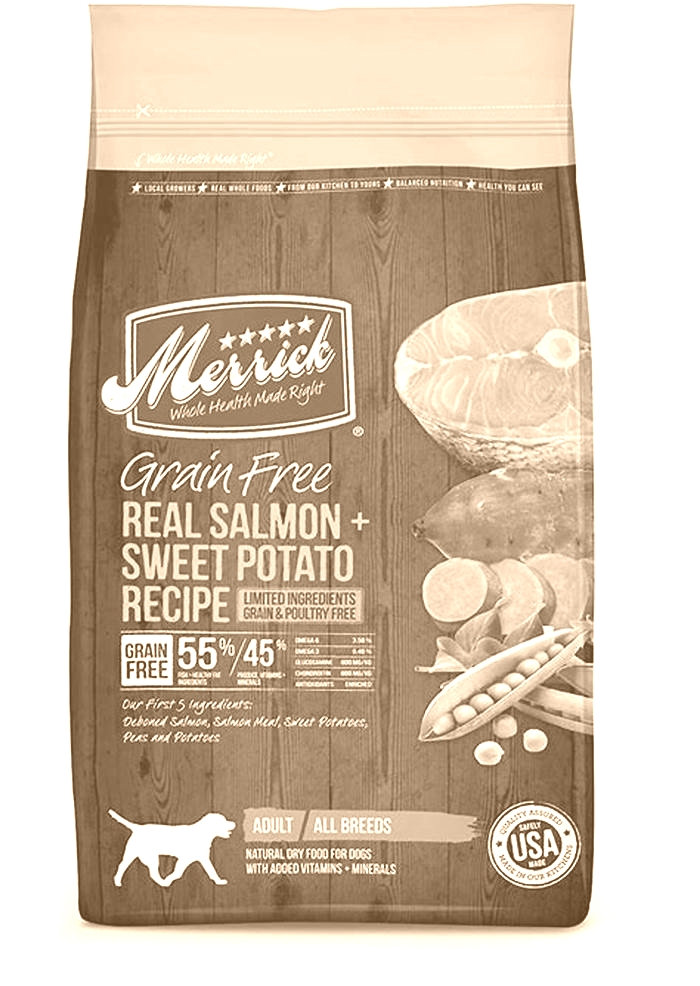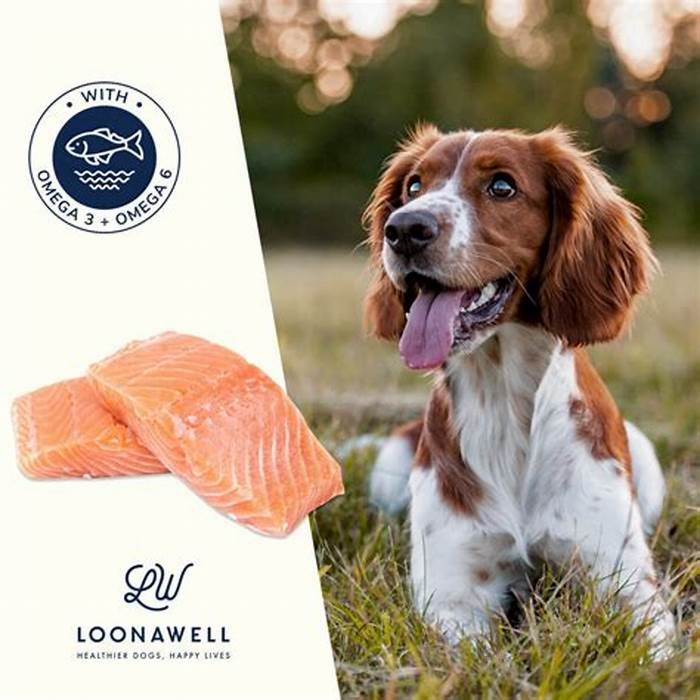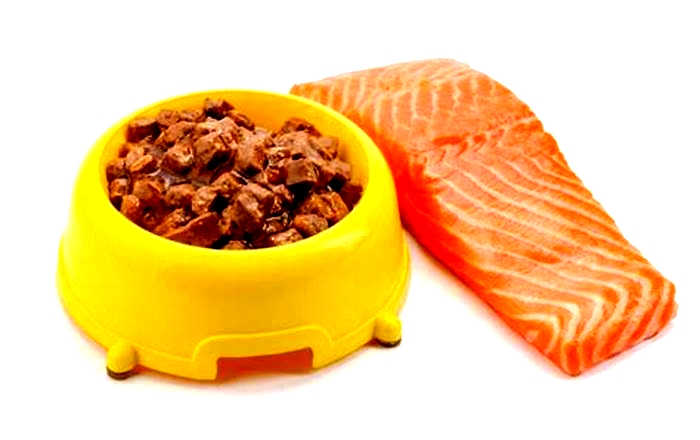Why Salmon is a Smart Choice for Your Dog s Nutrition

Seven Side Effects Of Too Much Salmon Oil For Dogs (And What To Do About It)
Vets say, Sola dosis facit veneum and its literal translation is The dose is what matters.
Even drinking too much water might harm, so it is possible to have too much of a good thing when it comes to salmon oil too.
The main side effects of too much salmon oil are hypervitaminosis D, vomiting, diarrhea, smelly breath, coat color change, weight gain, and itchy skin.
Salmon oil for dogs is a highly safe product, and only in rare cases can it have adverse effects. However, this is often due to high dosages. On the whole, salmon oil offers many benefits for dogs and cats.
With the proper dosing, you can avoid side effects, and the usual way to resolve this issue is by reducing the dosage for a few days.
Lets dig deeper!
Jump To:
What Is Salmon Oil for Dogs?
Although salmon oil is a common supplement for many pet parents, we are here to remind you and take a glance at all the benefits.
Salmon oil is derived from fresh salmon and is an excellent source of Omegas like EPA (eicosapentaenoic acid), DHA (docosahexaenoic acid), and ALA (alpha lipoic acid).
This product is used as a supplementation in pets, usually in a liquid form, since pills are not our dogs favorites.
Salmon oil can lead to a better functioning nervous system. Additionally, salmon oil can reduce symptoms of itchiness, allergies, and dry skin.
Its antioxidant and anti-inflammatory properties can be helpful in many disease treatments. Also, there is good evidence it is effective in combating arthritis pain.
You thought thats it? Well, you are wrong!
Regular salmon oil consumption can lead to a normal functioning cardiovascular system. Harmful levels of triglycerides can also be treated with salmon oil.
Here is a list of some of the most common health benefits of our Brilliant Salmon Oil:
- Enhancing appetite
- Improved urinary system
- Shiny coat
- Soft paws
- Increased energy
- Improved locomotory system healthy joints
- Improving cardiovascular system healthy heart
Top tip: Before purchasing any supplement, get in touch and consult your vet. Side effects are usually seen when instructions are not followed.
In general, this is a very safe supplement for both humans and dogs. Its benefits are recognized worldwide, and this product is becoming very popular.
Brilliant Salmon Oil Professional is available in the US, while Brilliant Salmon Oil Original is available in the UK.
7 Potential Sides Effects From Too Much Salmon Oil for Dogs
There are a few ways to calculate the recommended dose for your pet. The dose depends on the dogs weight and its current health status.
However, the best thing you can do before adding any supplement to your dogs kibble is to consult a professional.
We have a few instructions before using this product, but not following some might lead to side effects.
Our experience: In the end, each dog reacts differently to different products, so dont worry! For example, my dog can eat anything served in front of it, but my friends dog is the pickiest eater Ive ever seen.
Our #1 advice is to add this product gradually, just like any other new product. Not following this advice or not giving the proper dosage may lead to the following side effects:
- Hypervitaminosis D
- Vomiting
- Diarrhea
- Smelly breath
- Coat color change
- Weight gain
- Itchy skin
Hypervitaminosis D
Studies show that high dosages of supplements rich in vitamin D can lead to hypervitaminosis. The main symptoms are:
- Weight loss
- Brown stools
- Lack of appetite
- Apathy (no enthusiasm/energy)
- Terminal coma
These symptoms should never be underestimated. So, as soon as you notice them, take your dog to the vet.
The treatment procedure consists of reducing or excluding salmon oil from the dogs diet.
Important info: This side effect is rarely seen; in general, hypervitaminosis D is rare in dogs. This side effect only occurs after improper dosing
Vomiting
Foods with fatty acids can lead to a better life and overall health in dogs. But you should be aware of the recommended dosage.
Not all dogs can consume supplements. Some supplements may do more harm than good, depending on your dogs health status.
If your dog has some underlying disease, we emphasize consulting a professional before consuming it.
Also, vomiting can occur if the supplement is not given gradually.
However, our customers also reported reduced urge for vomiting due to our Brilliant Salmon Oil.
Top tip: Add salmon oil gradually to your pets bowl. If vomiting still occurs, stop adding salmon oil for a few days and gradually add reduced doses (1/4 of the recommended dose).
Diarrhea
Diarrhea is very common in pets after trying new food. So, take your time and dont push any food too much.
Some pets have sensitive stomachs, which is the reason for the diarrhea. If your dog has gastrointestinal issues, consult your vet if fatty acids suit your dogs current status.
But, be aware of the fact that EPA can reduce the symptoms of intestinal inflammation. According to studies, the side effects of Omegas are variable and uncommon.
If diarrhea symptoms are not frequent, ease salmon oil, and try with normal dosages after a couple of days.
Smelly Breath
Smelly breath in dogs can occur anytime, and it is not always related to food or supplements.
Over time, dogs can build up plaque on their teeth, leading to smelly breath. Regular dental vet checkups are required because of this reason.
If you notice smelly breath in your dog, try brushing your dogs teeth and stop adding supplements for 2 days. If the smell doesnt go away, visit a vet. If the smell goes away, try adding salmon oil again.
Ultimately, even our breath smell changes after trying different food and supplements. If you cant recall, try to sense your breath smell the next time you take vitamins.
Customers of Brilliant Salmon Oil very rarely report smelly breath from their pet. This is because Brilliant Salmon Oil has a very mild smell and is super fresh.
Coat Color Change
The interesting thing about Brilliant is that the production process is very quick, with almost no oxidation. Therefore, it contains 80% more astaxanthin than other products on the market.
This compound is an antioxidant with a red pigment or carotenoid.
Very occasionally pet parents report their dogs coat achieves an orange hue after using salmon oil. However, this needs to be scientifically proven.
Usually, our customers see skin and coat improvements after using Brilliant.
If you notice orange pigmentation, you can reduce the daily dose of salmon oil. Overdosing might also be the reason behind this side effect.
Weight Gain
Excessive weight gain is not common when using Brilliant Salmon oil. The product is carefully made and contains just one ingredient. We advise reading the products label to verify all the nutritional values.
Brilliant gives the best possible health benefits due to its gentle liberation with no excessive heat and no chemicals.
Brilliant is often used for increasing appetite in dogs. It also has remarkable GI-positive effects.
Itchy Skin
Great salmon oil formulas should never cause itchiness as a side effect. Contrarily, Omegas create a skin barrier that acts as a moisturizer and helps protects the skin.
So, itchy skin can only be seen in dogs that are allergic to salmon oil. This is another reason why gradual supplement adding is crucial.
What is a Good Salmon Oil Choice for My Dog?
Brilliant Salmon Oil (Professional is available in the US) is a high-quality product that is the number one choice for many pet owners. You can buy Brilliant Salmon Oil online as well as on Amazon, Pets at Home, Jollyes and Pets Corner.
Here are some of the benefits of this salmon oil:
- It contains all 21 omega-fatty acids
- 100% pure and totally fresh
- No toxicity
- Zero chemical processing
- Natural orange color
- Fresh salmon taste
- Fresh salmon smell
- Traced from fjord to bottle
- Minimal environmental impact
How Should I Store My Dogs Salmon Oil Supplement?
Salmon oil, in general, is prone to oxidation. Thats why salmon oil should be stored in an air tight container when manufactured.
Once opened, we recommend you use your salmon oil bottle within 4 months. This way, you avoid the risk of oxidation and rancidity. Until you open the bottle though, Brilliant Salmon Oil has an industry leading shelf life of 3.5 years!
Additionally, you should keep it away from light and air exposure.
Our recommendation: Keep the salmon oil unopened until use, and then consume within 4 months.
Remember that improper storage can lead to side effects due to light or heat exposure. To get the best of this product, it is essential to store it properly.
How to Dose Brilliant Salmon Oil?
Our 300ml bottle contains 300 pumps, while the 1000ml bottle contains 1000 pumps.
Our daily recommended dose is 1 pump per 6.6 lb (3kg). However, if your pet is new to marine-based supplements, we suggest smaller doses and gradually increasing it as pets get accustomed to it.
The maximum allowed is 12 pumps per day.
Dogs should consume 75-100 mg / kg of good quality fish oil. This can vary depending on your dogs health status.
| Dog Size | Pumps | Dosage (ml) |
| 6.6 lb (3kg) | 1 | 1 ml |
| 13.2 lb (6kg) | 2 | 2 ml |
| 19.8 lb (9kg) | 3 | 3 ml |
| 26.4 lb (12kg) | 4 | 4 ml |
| 33 lb (15kg) | 5 | 5 ml |
| 39.6 lb (18kg) | 6 | 6 ml |
| 46.2 lb (21kg) | 7 | 7 ml |
| 52.9 lb (24kg) | 8 | 8 ml |
| 59.5 lb (27kg) | 9 | 9 ml |
| 66.1 (30kg) | 10 | 10 ml |
| 72.7 lb (33kg) | 11 | 11 ml |
| 79.3 lb + (36kg +) | 12 | 12 ml |
To Sum Up: Side Effects Regarding Salmon Oil
If you follow Brilliants instructions, the chances of your dog getting side effects are minor.
However, nothing can be excluded. Each dog is considered an individual depending on its health status, daily habits, weight, etc.
So, before purchasing our oil, make sure to consult with a veterinarian.
Get your bottle of Brilliant and enjoy the many health benefits!
Salmon Nutrition and Health Benefits
Salmon is one of the most nutritious foods on the planet.
This popular fatty fish is not only loaded with nutrients but also may reduce certain risk factors for several diseases.
Whats more, its tasty, versatile, and widely available.
This article will explore some of the key benefits of salmon, along with a few easy ways to add it to your diet.
Salmon nutrition facts
The nutritional value of salmon can vary slightly among the varieties. For example, farmed salmon contains slightly more healthy fats and calories, whereas wild-caught salmon is a bit higher in protein (
However, both types are great sources of many key nutrients, including selenium, phosphorus, and B vitamins (
Here is a closer look at the nutritional value for a 3.5-ounce (100-gram) serving of cooked wild or farmed salmon (
Salmon is particularly high in selenium, an important nutrient that is involved in DNA synthesis, thyroid hormone metabolism, and reproductive health (
Its also a great source of omega-3 fatty acids, a type of heart-healthy fat that can decrease inflammation and support brain health (
Whats more, salmon is rich in vitamin B12, which is necessary for producing red blood cells and regulating the health of the central nervous system (
summarySalmon is a great source of protein, healthy fats, and various essential vitamins and minerals.
Watch now:
Get the recipe: Andys Crispy Salmon
Salmon health benefits
1. Rich in omega-3 fatty acids
Salmon is one of the best sources of the long-chain omega-3 fatty acids eicosapentaenoic acid (EPA) and docosahexaenoic acid (DHA).
A 3.5-ounce (100-gram) portion of farmed salmon has 2.3 grams of long-chain omega-3 fatty acids, while the same portion of wild salmon contains 2.2 grams (
Unlike most other fats, omega-3 fats are considered essential, meaning you must get them from your diet since your body cannot create them.
Generally, most health organizations recommend that healthy adults get a minimum of 2501,000 mg of combined EPA and DHA per day (
EPA and DHA have been credited with several impressive health benefits, such as decreasing inflammation, lowering blood pressure, reducing the risk of cancer, and improving the function of the cells that line your arteries (
One review of 22 studies found that using an EPA and DHA supplement consistently could significantly improve arterial function, especially in people who smoke, are overweight, or have high cholesterol levels or metabolic syndrome (
Whats more, studies have shown that getting these omega-3 fats from fish increases levels in your body even more effectively than supplementing with fish oil capsules (
As for how much fish to eat, consuming at least two servings of salmon per week can help you meet your omega-3 fatty acid needs.
SummarySalmon is rich in long-chain omega-3 fatty acids, which have been shown to reduce inflammation, lower blood pressure, and decrease risk factors for disease.
2. Great source of protein
Salmon is rich in high quality protein.
Like omega-3 fats, protein is an essential nutrient that you must get from your diet.
Protein plays a number of important roles in your body, including helping you heal after injury, protecting bone health, and maintaining muscle mass during weight loss and as you get older (14,
Recent research has found that for optimal health, each meal should provide at least 2030 grams of high quality protein (
For reference, a 3.5-ounce (100-gram) serving of salmon contains 2225 grams of protein (
SummaryYour body needs protein to heal after injury, protect bone health, and prevent muscle loss, among other things. Salmon provides 2225 grams of protein per 3.5-ounce (100-gram) serving.
3. High in B vitamins
Salmon is an excellent source of B vitamins.
Below is the B vitamin content in 3.5 ounces (100 grams) of wild salmon (
- Vitamin B12: more than 100% of the DV
- Niacin: 63% of the DV
- Vitamin B6: 56% of the DV
- Riboflavin: 38% of the DV
- Pantothenic acid: 38% of the DV
- Thiamine: 23% of the DV
- Folic acid: 7% of the DV
These vitamins are involved in several important processes in your body, including turning the food you eat into energy, creating and repairing DNA, and reducing chronic inflammation, which can lead to disease (
Additionally, studies have found that all the B vitamins work together to maintain optimal functioning of your brain and nervous system (
SummarySalmon is an excellent source of several B vitamins, which your body needs for producing energy, controlling inflammation, and protecting heart and brain health.
4. Good source of potassium
Salmon is quite high in potassium.
This is especially true of wild salmon, which provides 13% of the DV per 3.5 ounces (100 grams), versus 8% for farmed salmon (
In fact, wild salmon contains more potassium than an equivalent amount of banana, which provides just 9% of the DV (
Potassium helps manage your blood pressure and may also reduce the risk of stroke (
One review found that supplementing with potassium significantly reduced blood pressure levels in people with high blood pressure, especially for those consuming large amounts of sodium (
Potassium also works with sodium to help regulate fluid balance and lower blood pressure by preventing excess water retention (
SummaryA 3.5-ounce (100-gram) serving of salmon provides up to 13% of the DV for potassium, which helps manage blood pressure and prevent excess fluid retention.
5. Loaded with selenium
Selenium is a mineral found in soil and certain foods, including salmon (
Its considered a trace mineral, meaning your body needs only a small amount. Nevertheless, getting enough selenium in your diet is important.
Studies have shown that selenium helps protect bone health, decreases thyroid antibodies in people with autoimmune thyroid disease, and may potentially reduce the risk of certain types of cancer (
A 3.5-ounce (100-gram) serving of salmon provides 7585% of the DV for selenium (
Consuming salmon and other types of seafood has been shown to improve blood levels of selenium in people whose diets are low in this mineral (
One older study found that blood levels of selenium increased significantly more in people who consumed two servings of salmon per week than in those who consumed fish oil capsules containing less selenium (
SummaryA 3.5-ounce (100-gram) serving of salmon provides 7585% of the DV of selenium, a mineral that may support bone health, improve thyroid function, and protect against certain types of cancer.
6. Contains astaxanthin
Astaxanthin is a compound linked to several powerful health effects. As a member of the carotenoid family of antioxidants, astaxanthin gives salmon its signature red hue (
Astaxanthin appears to lower the risk of heart disease by reducing the oxidation of LDL (bad) cholesterol and increasing levels of HDL (good) cholesterol (
Some research also suggests that astaxanthin may reduce inflammation, decrease oxidative stress, and protect against the buildup of fatty plaque in the arteries, which could potentially reduce the risk of heart disease (
In addition, astaxanthin is believed to work with the omega-3 fatty acids found in salmon to protect the brain and nervous system against inflammation (
Whats more, astaxanthin may even help prevent skin damage and help you look younger.
In fact, one review reported that astaxanthin could act as an antioxidant, reduce the appearance of wrinkles, improve skin elasticity, and protect skin cells against damage (
According to a 2014 review, salmon contains 0.43.8 mg of astaxanthin per 3.5 ounces (100 grams), with sockeye salmon providing the highest amount (
SummaryAstaxanthin is an antioxidant found in salmon that may benefit heart, brain, nervous system, and skin health.
7. May reduce the risk of heart disease
Eating salmon on a regular basis may help protect against heart disease (
This is due, in large part, to salmons ability to boost levels of omega-3 fatty acids in the blood. Many people have too many omega-6 fatty acids in their blood in relation to omega-3s (
Research suggests that when the balance of these two fatty acids is off, the risk of heart disease increases (
In one older study, consuming 2 servings of farmed salmon per week increased omega-3 blood levels by 89% and decreased omega-6 levels after 4 weeks (
Additionally, some research suggests that regular consumption of fish may be linked to lower triglyceride levels and improvements in several other risk factors for heart disease (
SummaryConsuming salmon can help protect against heart disease by increasing levels of omega-3 fats, decreasing levels of omega-6 fats, and lowering triglycerides.
8. May benefit weight management
Consuming salmon frequently can help you lose weight and keep it off.
Like other high protein foods, it helps regulate the hormones that control appetite and help you feel full (
In addition, your metabolic rate temporarily increases more after eating protein-rich foods, such as salmon, compared with other foods (
Plus, research suggests that the omega-3 fats in salmon and other fatty fish may promote weight loss and decrease belly fat in people with obesity when combined with an active lifestyle, though more research is needed (
One study in children with nonalcoholic fatty liver disease found that supplementing with DHA, the main omega-3 found in salmon, led to significantly greater reductions in liver fat and belly fat compared with a placebo (
In addition, salmon is fairly low in calories. A 3.5-ounce (100-gram) serving of farmed salmon has only 206 calories, and wild salmon has even fewer at 182 calories (
SummaryConsuming salmon may help you manage your weight by reducing your appetite, temporarily boosting your metabolism, and decreasing belly fat.
9. Can help prevent inflammation
Salmon can provide powerful protection from chronic inflammation.
Many experts believe that inflammation is the root cause of most chronic diseases, including heart disease, diabetes, and cancer (
Several studies have found that eating more salmon and other types of seafood could help reduce several markers of inflammation (
In fact, one study in 4,105 people found that frequent consumption of fish was associated with lower levels of white blood cells, which are often used as a measure of chronic inflammation (
According to another review published in 2014, fish oil supplementation was found to significantly reduce levels of several specific markers of inflammation, including CRP, IL-6, and TNF-alpha (
SummarySalmon and other fatty fish can help lower inflammation, which may reduce risk factors for several diseases and improve symptoms in people with inflammatory conditions.
10. May protect brain health
A growing number of studies suggest that including salmon in your diet might improve brain function.
Both fatty fish and fish oil have been found to protect fetal brain health during pregnancy, slow cognitive decline, and preserve brain function (
One review found that consuming at least 2 servings of fish per week was associated with a 10% lower risk of dementia and a 30% lower risk of Alzheimers disease (
Another 2020 review concluded that fish consumption could improve memory performance, promote brain function, and protect brain structure in healthy adults (
SummaryFrequent salmon consumption may help protect fetal brain health in pregnancy, preserve brain function, and decrease the risk of cognitive decline and dementia.
11. Can improve mental health
In addition to protecting brain health, some promising studies suggest that salmon could support mental health, thanks to its content of omega-3 fatty acids.
According to a review of 10 studies, consuming at least 1 serving of fish per week or 500 mg of omega-3 fatty acids per day was associated with a lower risk of depression, especially in women (
However, more high quality randomized control trials are needed.
Another small study in 23 young adults found that taking an omega-3 fatty acid supplement led to significant improvements in symptoms of depression after 21 days (
Some research also suggests that omega-3 fatty acids could reduce symptoms of anxiety and improve mood, though more studies are needed (
SummarySome studies have found that eating fish or increasing your intake of omega-3 fatty acids could reduce symptoms of depression and anxiety and improve mood.
12. May help maintain healthy vision
Salmon contains several nutrients necessary for promoting eye health and maintaining vision.
For example, astaxanthin has been studied in humans and animals for its ability to prevent certain disorders that can affect eye health, including age-related macular degeneration, eye fatigue, uveitis, and cataracts (
Salmon also contains a good amount of vitamin A in each serving, with around 8% of the DV in a 3.5-ounce (100-gram) serving of farmed salmon (
Vitamin A is essential for vision and is a precursor for certain pigment molecules in the photoreceptors of the eye (
Whats more, other research suggests that omega-3 fatty acids could be beneficial for the treatment of dry eye disease (
SummarySalmon contains nutrients like astaxanthin, vitamin A, and omega-3 fatty acids, all of which could help promote eye health.
13. Could support bone health
Salmon is a great source of vitamin D, with around 66% of the DV in a 3.5-ounce (100-gram) serving of farmed salmon (
Vitamin D is an important micronutrient that plays a central role in bone health by increasing the absorption of calcium (
Research shows that low levels of vitamin D may be linked to an increased risk of bone loss and reduced bone mineral density in older adults (
Salmon also contains phosphorus, another nutrient important for maintaining bone strength (
Interestingly, some studies have found that eating more fish could be tied to a lower risk of osteoporosis for certain populations, but more research is needed (
SummarySalmon is rich in vitamin D and phosphorus, which can support bone health. Some studies show that eating fish could be linked to a lower risk of osteoporosis, but more research is needed.
14. Delicious and versatile
Salmon is undeniably delicious. It has a unique, delicate flavor with a less fishy taste than many other varieties of fatty fish, such as sardines and mackerel.
It is also extremely versatile. It can be steamed, sauteed, smoked, grilled, baked, or poached. It can also be served raw in sushi and sashimi.
Additionally, canned salmon is a quick and inexpensive option that provides the same impressive health benefits as fresh fish. In fact, almost all canned salmon is wild rather than farmed, and its nutrition profile is excellent.
Look for it in BPA-free cans to avoid the potential health risks that have been linked to this chemical.
How to incorporate more salmon into your diet
Here are some healthy ideas for incorporating salmon into your diet:
- Use canned salmon in place of tuna when making tuna salad with healthy mayo.
- Whip up a Cobb salad with canned salmon, hard-boiled eggs, avocados, lettuce, and tomatoes.
- Enjoy smoked salmon and cream cheese on sprouted-grain bread with cucumber or tomato slices.
- Try making grilled salmon with avocado sauce.
- Bake an herb-crusted salmon with a side of veggies for an easy weeknight dinner.
SummarySalmon has a delicious flavor and can be prepared in many different ways. Canned salmon is a convenient and inexpensive option.
Potential health risks of eating salmon
Though salmon is a nutrient-dense food and can be a great addition to a balanced diet, there are a few downsides and risks to consider.
For starters, both wild and farmed varieties of salmon often contain contaminants such as polychlorinated biphenyls (PCBs) and dioxin, which can alter hormone levels and negatively affect other aspects of health if consumed in high amounts (
However, there are strict government regulations for the number of contaminants permitted in feed, which are intended to reduce the number of contaminants in seafood (71).
Antibiotics are also often added to feed for farmed fish. Antibiotic use is associated with environmental concerns and could increase the risk of antibiotic resistance and other long-term health effects (
Avoiding fish from areas with less strict regulations on antibiotic use such as Chile could be beneficial if youre concerned about antibiotic resistance (74).
Additionally, keep in mind that salmon contains some mercury, though it is much lower in mercury than some other fish, such as swordfish and shark (
If youre pregnant, its generally recommended that you consume 23 servings of fatty fish, including salmon, per week and avoid uncooked or raw seafood (
SummarySalmon contains some contaminants and heavy metals, such as mercury, which can be harmful if consumed in high amounts. Farmed fish from some areas, like Chile, may be treated with high amounts of antibiotics, which may contribute to antibiotic resistance.
The bottom line
Salmon is a nutritional powerhouse that provides several impressive health benefits.
Consuming at least two servings per week can help you meet your nutrient needs and reduce the risk of several diseases.
In addition, salmon is tasty, satisfying, and versatile. Including this fatty fish as a regular part of your diet may very well improve your quality of life and your health.









